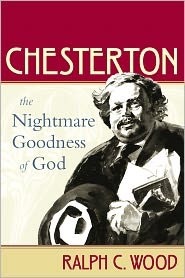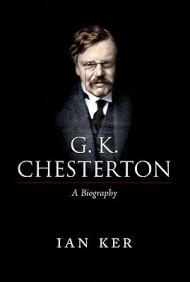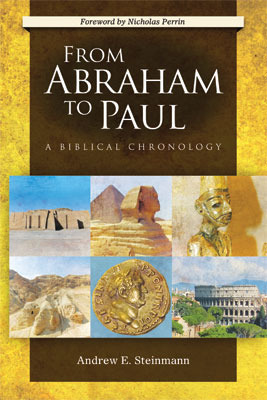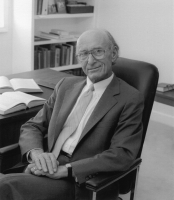Justin Taylor's Blog, page 277
October 11, 2011
Ken Myers: "The Current Economic Crisis: How to Live Well in a Time of Uncertainty"
On August 28, 2009, Ken Myers of Mars Hill Audio gave a two-hour talk at the Richmond Study Center on "the assumptions that underlie modern thinking about the economy and how those assumptions have actually contributed to the current economic crisis, how a biblical worldview calls us to a fundamentally different way of thinking, and how we ought to put that worldview into action."
He asked two overarching questions: (1) How might the lives of believers properly reflect what we believe? (2) How did the West get into the shape that it's in?
His goal is that we would (1) start to have a larger definition of economics; (2) see that economics is a subset of culture; (3) live as Christ's disciples with different patterns of economic behavior.
David Platt: "Marriage, Family, Sex, and the Gospel"
David Platt:
Manhood. Womanhood. Marriage. Parenting. Singleness. Sex. Divorce. Homosexuality. Same-sex marriage. Polygamy. Pornography. Adoption. Abortion. Cultures around the world perceive each of these issues differently. So how does God's Word address them? During Secret Church on November 4, 2011, we will explore how the gospel uniquely affects our understanding of family, marriage, sex, and a host of related (and controversial) issues that are ultimately foundational for the display of the glory of God in our lives, in the church, and in the world.
This is a six-hour livestream of David teaching through these issues. You can find out more here regarding tickets for families, small groups, churches, etc.
Two New Books on G. K. Chesterton
G.K. Chesterton died 75 years ago this year. Perhaps that is the occasion for two new major works on him to appear in 2011:
 Ralph C. Wood, Chesterton: The Nightmare Goodness of God (Baylor University Press, 2011).
Ralph C. Wood, Chesterton: The Nightmare Goodness of God (Baylor University Press, 2011).BUP's description:
The literary giant G. K. Chesterton is often praised as the "Great Optimist"—God's rotund jester. In this fresh and daring endeavor, Ralph Wood turns a critical eye on Chesterton's corpus to reveal the beef-and-ale believer's darker vision of the world and those who live in it. During an age when the words grace, love, and gospel, sound more hackneyed than genuine, Wood argues for a recovery of Chesterton's primary contentions: First, that the incarnation of Jesus was necessary and reveals a world full not of a righteous creation but of tragedy, terror, and nightmare; and second, that the problem of evil is only compounded by a Christianity that seeks progress, political control, and cultural triumph.
Wood's sharp literary critique moves beyond formulaic or overly pious readings to show that, rather than fleeing from the ghoulish horrors of his time, Chesterton located God's mysterious goodness within the existence of evil. Chesterton seeks to reclaim the keen theological voice of this literary authority who wrestled often with the counterclaims of paganism. In doing so, it argues that Christians may have more to learn from the unbelieving world than is often supposed.
"The finest study of Chesterton in many years. It is precisely because Wood has not turned a blind eye to Chesterton's faults that he has succeeded so powerfully in demonstrating Chesterton's genius and continued importance for us today."
—David Bentley Hart, author of Atheist Delusions: The Christian Revolution and Its Fashionable Enemies
"Who better to make sense of G. K. Chesterton's quarrel with secular humanism? Wood brilliantly helps us navigate the trail Chesterton blazed through our modern Inferno."
—Daniel McInerny, Associate Professor of Philosophy in the Honors College, Baylor University
"Wood has triumphed once again. He shows how great Christian art is often paradoxically dark when conveying the light and he is a superb guide through the gloomy and yet glimmering wonderland of Chesterton's work."
—Joseph Pearce, Associate Professor of Literature, Ave Maria University and author of Wisdom of Innocence: A Life of G. K. Chesterton
Introduction
1. Man as Holy Monster: Christian Humanism, Evolution, and Orthodoxy
2. Patriotism and the True Patria: Distributism, Hymns, and Christendom in Dublin
3. Militarism and the Church Militant: Lepanto, Defense of World War I, and "The Truce of Christmas"
4. The Waning of the West and the Threat of Islam: The New Jerusalem and The Flying Inn
5. Tyrannical Tolerance and Ferocious Hospitality: The Ball and the Cross
6. The Bane and Blessing of Civilization: Torture, Democracy, and The Ballad of the White Horse
7. The Nightmare Mystery of Divine Action: The Man Who Was Thursday
 Ian Ker, G. K. Chesterton: A Biography (Oxford University Press, 2011).
Ian Ker, G. K. Chesterton: A Biography (Oxford University Press, 2011).OUP's description:
G. K. Chesterton is remembered as a brilliant creator of nonsense and satirical verse, author of the Father Brown stories and the innovative novel, The Man Who Was Thursday, and yet today he is not counted among the major English novelists and poets. However, this major new biography argues that Chesterton should be seen as the successor of the great Victorian prose writers, Carlyle, Arnold, Ruskin, and above all Newman.
Chesterton's achievement as one of the great English literary critics has not hitherto been fully recognized, perhaps because his best literary criticism is of prose rather than poetry. Ian Ker remedies this neglect, paying particular attention to Chesterton's writings on the Victorians, especially Dickens. As a social and political thinker, Chesterton is contrasted here with contemporary intellectuals like Bernard Shaw and H. G. Wells in his championing of democracy and the masses. Pre-eminently a controversialist, as revealed in his prolific journalistic output, he became a formidable apologist for Christianity and Catholicism, as well as a powerful satirist of anti-Catholicism.
This full-length life of G. K. Chesterton is the first comprehensive biography of both the man and the writer. It draws on many unpublished letters and papers to evoke Chesterton's joyful humour, his humility and affinity to the common man, and his love of the ordinary things of life.
"Any biography of this size is bound to have some elements of dry, encyclopedic chronology; but in Ker's book, they are far more the exception than the rule. On just about every page, one will find extended quotes from Chesterton, of the kind that display his personality and overall joie de vivre. The author made me rediscover my early love of Chesterton and his perspective on the world, and for that I am deeply grateful."
—Michael Potemra, National Review Online
"There are some genuinely good books on Chesterton. . . But the need for a proper critical biography has long been acknowledged, and Ker has supplied it. Now, and for the foreseeable future, for any true understanding of the scope of G.K. Chesterton's achievement, which captures not only the sage but the good, gentle, generous man, Ker's biography will be indispensable."
—The Weekly Standard
Heaven, Hell, and Spiritual Prudes
C. S. Lewis:
I spoke just now of fiddling while Rome burns. But to a Christian the true tragedy of Nero must be not that he fiddled while the city was on fire but that he fiddled on the brink of hell.
You must forgive me for the crude monosyllable. I know that many wiser and better Christians than I in these days do not like to mention heaven and hell even in the pulpit. I know, too, that nearly all the references to this subject in the New Testament come from a single source. But then that source is Our Lord himself. People will tell you it is St. Paul, but that is untrue. These overwhelming doctrines are dominical. They are not really removable from the teaching of Christ or of His Church.
If we do not believe them, our presence in this church is great tomfoolery.
If we do, we must overcome our spiritual prudery and mention them.
—C. S. Lewis, "Learning in War-Time" (1939)
How Could a Good God Allow Suffering?
D. A. Carson (author of How Long, O Lord? Reflections on Suffering and Evil), from the Gospel Coalition LA Regional Conference (November 6, 2010):
A Biblical Chronology from Abraham to Paul
 I'm not aware of any recent book that attempts to do what Andrew Steinmann (professor of theology and Hebrew at Concordia University, Chicago) has done with his new book: From Abraham to Paul: A Biblical Chronology (Concordia Publishing House, 2011). In fact, Eugene Merrill says that "this meticulous and magnificent [work is an] addition to (indeed, replacement of) such magisterial works on biblical chronology as those by Edwin Thiele and Jack Finegan."
I'm not aware of any recent book that attempts to do what Andrew Steinmann (professor of theology and Hebrew at Concordia University, Chicago) has done with his new book: From Abraham to Paul: A Biblical Chronology (Concordia Publishing House, 2011). In fact, Eugene Merrill says that "this meticulous and magnificent [work is an] addition to (indeed, replacement of) such magisterial works on biblical chronology as those by Edwin Thiele and Jack Finegan."
You can download a 48-page excerpt from the book here. You can also see his basic NTChronology and OT Chronology online.
Nicholas Perrin (Franklin S. Dyrness Chair of Biblical Studies at Wheaton College Graduate School) writes in the foreword:
Andrew E. Steinmann's From Abraham to Paul . . . is a book which should have been written decades ago. Here's why. Steinmann not only assumes quite rightly that history matters, but he also shows two things about biblical history.
First, he shows that in many cases with a little scholarly spadework we can have a pretty good idea as to when key events took place, events like the life of Abraham, the Conquest of the Promised Land, the birth of Jesus, or Paul's Second Missionary Journey. These events are not the yarn of legend: on the contrary, there is every good intellectually-compelling reason to accept them as history, history that really happened in time and space. . . .
The second thing Steinmann shows about history and this is no less important is its complexity. Some of the questions which the book takes up are thorny questions indeed, having provoked lots of black ink and fiery debate along the way. The author's approach is never polemical, but always clear; the positions taken are not necessarily always the standard positions, but they are always defended from the evidence. Indeed, it is precisely this quality that makes the book such a delight to read. . . .
We should be grateful for books like this. We should be grateful, because God made history and history matters. Apart from the conviction that our faith is a historical faith, we are left only to cast about. But, when we are fully persuaded that sacred history meshes with the history in which we live and move and have our being, that is when biblical faith becomes a real possibility. Likewise, every intellectually serious reader of the Bible (pious or not so pious) will learn to think twice before allowing himself or herself to be bullied (happily or anxiously) by the skeptics. True, there is so much we don't know. But, by the same token, there is much we can know and know with some confidence.
Old, Settled, and Reformed
What will gospel-centered theology and practice look like 20 years from now? Where can things go wrong?
A post and a discussion for your consideration:
Douglas Wilson, "'Old, Settled, and Reformed' Is Coming at You Like a Freight Train"
J.D. Grear (author of Gospel), Trevin Wax (author of Counterfeit Gospels, and Greg Gilbert (author of What Is the Gospel? and co-author of What Is the Mission of the Church?):
October 10, 2011
Why Me?
Arthur Ashe, winner of three Grand Slam titles in tennis, contracted HIV during a blood transfusion for his second heart surgery. He died in 1993 at the age of 49 from AIDS-related pneumonia. In his memoirs he wrote the following insightful words:
Quite often, people who mean well inquire of me whether I ever ask myself, in the face of my diseases, "Why me?"
I never do.
If I ask "Why me?" as I am assaulted by heart disease and AIDS, I must ask "Why me?" about my blessings, and question my right to enjoy them.
The morning after I won Wimbledon in 1975, I should have asked 'Why me?' and doubted that I deserved the victory. If I don't ask 'Why me?' after my victories, I cannot ask 'Why me?' after my setbacks and disasters. (p. 326)
Days of Grace (New York, NY: Alfred A. Knopf, New York, 1993), p. 290.
Compare this beautiful meditation from David Powlison:
So often the initial reaction to painful suffering is Why me? Why this? Why now? Why? . . .
[God] comes for you, in the flesh, in Christ, into suffering, on your behalf. He does not offer advice and perspective from afar; he steps into your significant suffering. He will see you through, and work with you the whole way. He will carry you even in extremis. This reality changes the questions that rise up from your heart. That inward-turning "why me?" quiets down, lifts its eyes, and begins to look around.You turn outward and new, wonderful questions form.
Why you?
Why you?
Why would you enter this world of evils?
Why would you go through loss, weakness, hardship, sorrow, and death?
Why would you do this for me, of all people?
But you did.
You did this for the joy set before you.
You did this for love.
You did this showing the glory of God in the face of Christ.
As that deeper question sinks home, you become joyously sane. The universe is no longer supremely about you. Yet you are not irrelevant. God's story makes you just the right size. Everything counts, but the scale changes to something that makes much more sense. You face hard things. But you have already received something better which can never be taken away. And that better something will continue to work out the whole journey long.
The question generates a heartfelt response:
Bless the Lord, O my soul, and do not forget any of his benefits, who pardons all your iniquities and heals all your diseases, who redeems your life from the pit, who crowns you with lovingkindness and compassion, who satisfies your years with good things so that your youth is renewed like the eagle.
Thank you, my Father. You are able to give true voice to a thank you amid all that is truly wrong, both the sins and the sufferings that now have come under lovingkindness.
Finally, you are prepared to pose—and to mean—almost unimaginable questions:
Why not me?
Why not this?
Why not now?
If in some way, my faith might serve as a three-watt night-light in a very dark world, why not me?
If my suffering shows forth the Savior of the world, why not me?
If I have the privilege of filling up the sufferings of Christ?
If he sanctifies to me my deepest distress?
If I fear no evil?
If he bears me in his arms?
If my weakness demonstrates the power of God to save us from all that is wrong?
If my honest struggle shows other strugglers how to land on their feet?
If my life becomes a source of hope for others?
Why not me?
Of course, you don't want to suffer, but you've become willing: "If it is possible, let this cup pass from me; yet not as I will, but as you will."
Like him, your loud cries and tears will in fact be heard by the one who saves from death.
Like him, you will learn obedience through what you suffer.
Like him, you will sympathize with the weaknesses of others.
Like him, you will deal gently with the ignorant and wayward.
Like him, you will display faith to a faithless world, hope to a hopeless world, love to a loveless world, life to a dying world.
If all that God promises only comes true, then why not me?
—David Powlison, "God's Grace and Your Sufferings," in Suffering and the Sovereignty of God (pp. 172-173).
How to Think on Your Feet
You will not be able to extemporize good thinking unless you have been in the habit of thinking and feeding your mind with abundant and nourishing food. Work hard at every available moment. Store your minds very richly, and then, like merchants with crowded warehouses, you will have goods ready for your customers, and having arranged your good things upon the shelves of your mind, you will be able to hand them down at any time without the laborious process of going to market, sorting, folding, and preparing. . . . Take it as a rule without exception, that to be able to overflow spontaneously you must be full.
HT: Trevin Wax
Arthur F. Holmes (1924-2011)
 Arthur Holmes, the longtime Wheaton College professor of philosophy who championed the vision that "all truth is God's truth," went to be with the Lord this past weekend (October 8, 2011).
Arthur Holmes, the longtime Wheaton College professor of philosophy who championed the vision that "all truth is God's truth," went to be with the Lord this past weekend (October 8, 2011).
On a blog post commenting on his death, two of his colleagues express their gratitude and remembrance:
"Arthur Holmes was a great Christian and a fine philosopher. We Christians who value the life of the mind must thank and praise the Lord for Art and his life, and we must do our best to see that his tradition is carried on and developed."
—Alvin Plantinga (University of Notre Dame)
"Arthur Holmes was one of the greatest mentors of his generation, calling evangelicals to pursue their love of God not merely with their heart and soul but with their mind. A great many students became academics through his influence. I affirm Al Plantinga's suggestion that the best way to honor his memory and show gratitude to the Lord for Arthur's example is to press on with the task of pursuing Truth, and encouraging others to do the same."
—David Lyle Jeffrey (Wheaton College)
Justin Taylor's Blog
- Justin Taylor's profile
- 44 followers



